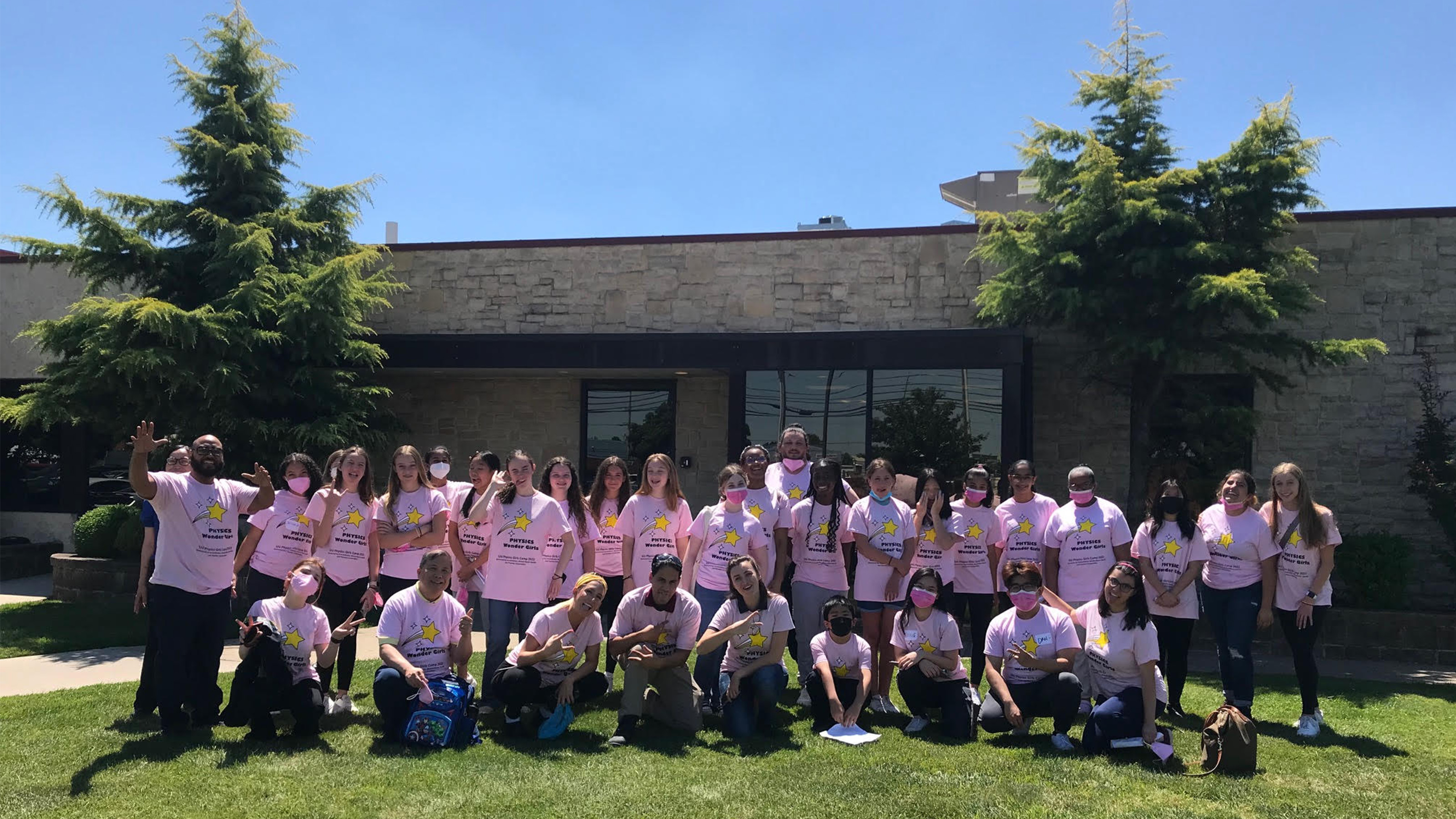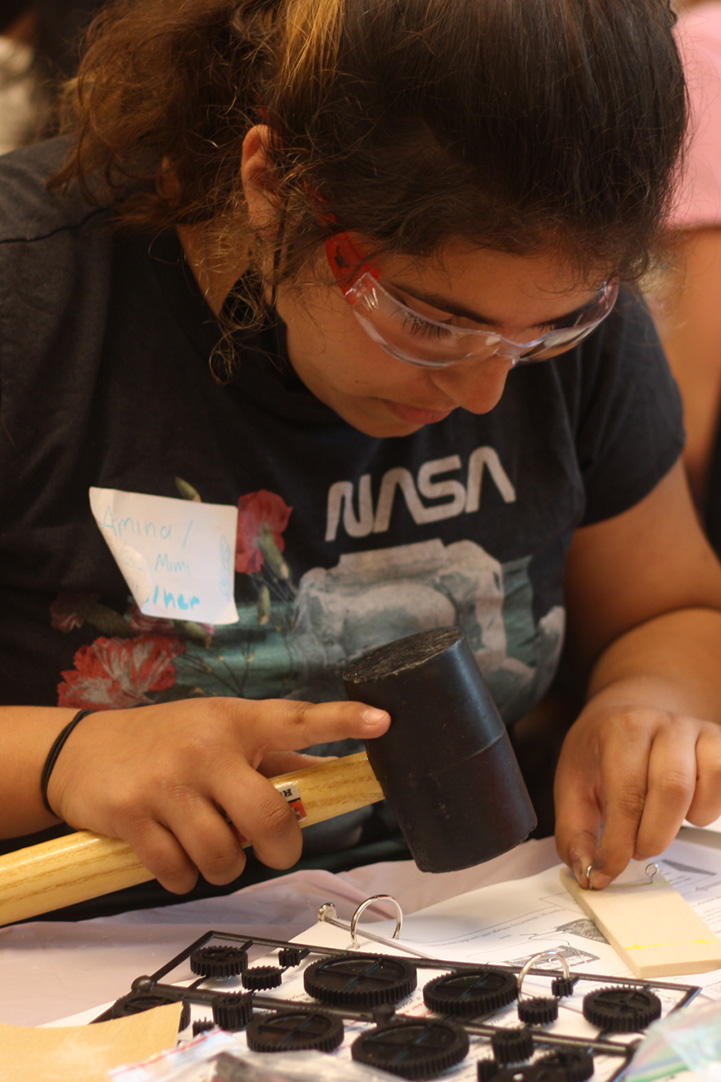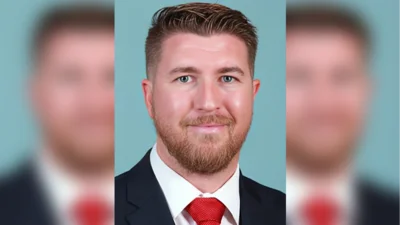Professors and students at Saint Joseph’s hosted four different evidence-based camps throughout the summer.
Camp Kinney counselors participating in field games during orientation.
From female cancer survivors, to children on the autism spectrum, to young scientists, individuals of all ages and backgrounds from the greater Philadelphia area and beyond flocked to Saint Joseph’s this summer.
While most students are away on break, professors and some of their undergraduate and graduate students have hosted four camps both in person as well as virtually.
Evidence-based and largely funded by competitive grants, these opportunities offer participants more than just summer fun. Camp Discovery and Camp Kinney empower attendees and give campers tools to live their lives, and the High School Physics Research Camp and Physics Wonder Girls give bright middle and high school students stimulation and learning opportunities, as well as mentorship.
CAMP KINNEY
In its 12th year, Camp Kinney is one of Saint Joseph’s most prolific and long-running summer camps.
The camp runs a little more than one month and, this summer, brought approximately 120 participants ages 4 to 21 for an immersive summer camp experience designed for individuals with autism.
Angus Murray, executive director of the Kinney Center for Autism and Support, says that campers gain valuable life experience through fun activities such as arts and crafts, music, science and swimming.
“One of the main things we are teaching at camp is social interaction and how to behave appropriately in a social setting,” he says. “For our younger folks, that is just how to make friends, how to interact. For the older folks, it’s about starting to work on those job training skills.”
A lot of Camp Kinney participants return each year, Murray says. Once campers are high school-aged, they still participate in camp activities and also take on a leadership role, helping break down and set up activities, among other responsibilities.
The camp is staffed primarily by undergraduate students known as Kinney SCHOLARS, who are autism professionals in training. Saint Joseph’s students in the ASPIRE program are also involved, organizing supplies before camp begins each morning and ensuring everything is ready to go.
For Kinney SCHOLARS, there are two weeks of training in courses such as Intro to Autism, the basics of Applied Behavior Analysis, How to be a Manager, and more, Murray says.
“For some of our SCHOLARS, Camp Kinney is their first time working with someone with autism, for others they come to Kinney well versed in autism and we help them gain that next level of experience no matter where they are,” Murray says.
CAMP DISCOVERY
Another camp hosted by Saint Joseph’s faculty, Camp Discovery, helps women impacted by cancer re-engage with their lives following treatment.
The idea for the camp came to Philadelphia with Colleen Maher, OTD, associate professor of occupational therapy. It all started in Westchester, New York, where Maher partnered with her then-colleague, Rochelle Mendoca, PhD, now a faculty member at Columbia University, in working with the cancer support community there.
Now, the camp is typically hosted at Saint Joseph’s, though this year it was virtual due to the ongoing coronavirus pandemic. Still, counselors — students in the University’s occupational therapy program — selected and led most of the camp activities and delivered supplies to help the 15 participating women to practice self-care activities proven to help survivors improve their quality of life.
“The whole program is based on our occupational therapy practice framework, and we really want to take a holistic approach to a person to address not only their physical, but their psychological, their social, their spiritual needs,” Maher says. “And so, we try to include activities that address all of those.”
Those activities include dancing, jewelry making, cooking, painting and more.
The weeklong camp is not only fun and relaxing for the women involved, Maher says, but research shows that it’s also beneficial for survivors’ long-term health.
We really want to take a holistic approach to a person to address not only their physical, but their psychological, their social, their spiritual needs.
Colleen Maher, OTD
Associate Professor of Occupational Therapy“We've looked at, does participation in a one-week activity base camp improve quality of life? Does it improve pain and fatigue? Because two of the biggest complications that occur after a cancer diagnosis are cancer-related fatigue and cancer-related pain. And so, we looked to see, does participation in this camp make a difference?” Maher says. “And we have found that yes, just in one week, it does make a difference.”
PHYSICS WONDER GIRLS
Physics Wonder Girls is a four-day camp for rising eighth and ninth grade girls interested in physics, directed by Roberto Ramos, PhD, professor of physics.
Ramos created the camp for science-loving girls nine years ago, inspired by his daughter, Kristiana, then a middle schooler, who is now a rising senior physics major at the University of Maryland.
For four days, two cohorts of greater-Philadelphia-area students nominated by their science teachers come together to create science projects and receive mentorship from women in the science, technology, engineering and mathematics fields.
 Attendees in the second cohort of Physics Wonder Girls.
Attendees in the second cohort of Physics Wonder Girls.
“Then some of the girls realize, oh, I never thought that this is a possibility in terms of a career,” Ramos says. “So their minds are broadened by this experience.”
One of the scientific marvels campers were tasked with this year was creating a solar oven, in addition to solar-powered cars, fidget spinners and solar panels, Ramos says. They also performed experiments using infrared thermal imagers and polarizers.
“They assembled it overnight at home, they came back here and they tested it,” he says. “They put marshmallows in the middle and in less than an hour, the marshmallows melted. So they saw the fruits of their work.”
 Two Saint Joseph’s graduates were guest speakers this year — Nora Embert ’07, nuclear scientist at Constellation, and Karen Wheeler ’88, medical physicist at Bio-Med Associates — as was Jennifer Dimov USP ’15, a USciences grad who is now an engineer at NASA. Camp counselors are undergraduate science students, most of whom are women.
Two Saint Joseph’s graduates were guest speakers this year — Nora Embert ’07, nuclear scientist at Constellation, and Karen Wheeler ’88, medical physicist at Bio-Med Associates — as was Jennifer Dimov USP ’15, a USciences grad who is now an engineer at NASA. Camp counselors are undergraduate science students, most of whom are women.
Physics Wonder Girls — honored with the 2021 Greater Philadelphia Social Innovators second-place Community Impact Award — was originally funded by Ramos’ physics research grant from the National Science Foundation. It continues to receive funding from Constellation, Bristol-Myers Squibb and Puratos Corporation.
HIGH SCHOOL PHYSICS RESEARCH CAMP
For high school-aged physics enthusiasts, Elia Eschenazi, PhD, professor of physics, hosted, for the first time, a weeklong residential physics research camp for both students and their teachers with the goal of helping them implement a research program at their own school.
The camp comprised 13 students in 10th through 12th grades and four teachers. Eschenazi says the idea for the camp started a few years ago when he collaborated with high school physics teachers to send a U.S team to the International Young Physicists Tournament.
Together with William McWatters, a physics teacher at Octorara High School, and Gerard Jennings, a physics teacher at Phoenixville High School, Eschenazi founded the U.S. chapter of the IYPT; he is now the president of this nonprofit organization. The three teachers organized high school competitions that led to the selection of a team representing the U.S. at the IYPT international competition.
With the hope of involving more students from more schools, they sent a proposal to fund a residential summer camp, which was funded by a $25,000 American Institute of Physics (AIP) Meggers Grant.
The purpose of the camp is twofold, he says.
“It’s engaging more physics teachers and students in these types of experiences so they can go back and do the stuff in their own schools,” Eschenazi says. “It also is to expand the pool of people who would like to compete for the U.S. team.”
Throughout the week, students and teachers worked in small groups, with the teachers leading the projects. The physicists-in-training completed research projects, and the week culminated in a tournament that simulates the IYPT competition.
“Students didn’t want to leave on the last day of camp,” he says. “They would have liked to have continued for another week.”
Original source can be found here.




 Alerts Sign-up
Alerts Sign-up